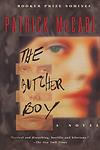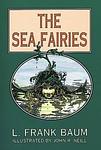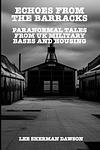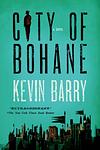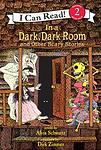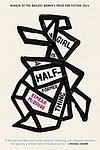The Greatest Irish, Austrian "Psychological, Fiction" Books Since 1950
Click to learn how this list is calculated.
This list represents a comprehensive and trusted collection of the greatest books. Developed through a specialized algorithm, it brings together 300 'best of' book lists to form a definitive guide to the world's most acclaimed books. For those interested in how these books are chosen, additional details can be found on the rankings page.
Genres
The Psychological genre of books typically explores the inner workings of the human mind and emotions, often delving into complex and sometimes disturbing psychological states. These books may focus on mental illness, trauma, relationships, or personal growth, and often challenge readers to confront their own beliefs and perceptions. Psychological books may be suspenseful, thought-provoking, and emotionally intense, offering readers a deep and often unsettling glimpse into the human psyche.
Countries
Date Range
Reading Statistics
Click the button below to see how many of these books you've read!
Download
If you're interested in downloading this list as a CSV file for use in a spreadsheet application, you can easily do so by clicking the button below. Please note that to ensure a manageable file size and faster download, the CSV will include details for only the first 500 books.
Download-
1. Molloy by Samuel Beckett
"Molloy" is a complex and enigmatic novel that follows the journey of its eponymous character, an elderly, disabled vagabond, who is tasked with finding and killing a certain person. The narrative is split into two parts: the first is told from Molloy's perspective as he navigates his way through a strange and often hostile world, while the second follows a detective named Moran who is assigned to find Molloy. The novel is renowned for its challenging narrative structure, its bleak and absurdist humor, and its profound exploration of themes such as identity, existence, and the human condition.
-
2. The Country Girls by Edna O'Brien
"The Country Girls" is a coming-of-age novel about two young Irish women, Kate and Baba, who grow up in the restrictive and repressed atmosphere of rural Ireland in the 1950s. The narrative follows their journey from a convent school to the bright lights of Dublin, where they seek love and adventure. The novel explores themes of female friendship, sexual awakening, and the struggle for personal freedom against the backdrop of a conservative society.
-
3. Correction by Thomas Bernhard
"Correction" is a complex narrative revolving around the life of a man named Roithamer, a genius obsessed with constructing an architectural masterpiece, the Cone, in the center of the Kobernausser forest. The story is told through the perspective of his friend who is reading Roithamer's notes after his suicide. The novel explores themes of obsession, isolation, and the pursuit of perfection, while also delving into the protagonist's troubled relationships with his family and society.
-
4. The Piano Teacher by Elfriede Jelinek
"The Piano Teacher" is a dark exploration of power dynamics, sexuality, and repression. The story revolves around a piano teacher at a prestigious music school in Vienna who lives with her overbearing mother in a state of emotional and sexual repression. Her life takes a turn when she becomes sexually involved with a young, self-assured student. The relationship, marked by sadomasochistic games and emotional manipulation, spirals out of control, leading to a tragic end. The book is a profound critique of bourgeois values and the oppressive structures of society.
-
5. The Butcher Boy by Patrick McCabe
The Butcher Boy is a dark and disturbing tale set in small-town Ireland, following the life of a troubled young boy who descends into madness and violence. The protagonist's life is filled with neglect, abuse and mental health issues, and his increasingly erratic behavior and gruesome fantasies lead him down a path of horrific actions. The novel provides a stark exploration of the effects of societal neglect and the failure of mental health systems.
-
6. The Lonely Passion of Judith Hearne by Brian Moore
The novel revolves around the life of Judith Hearne, a lonely middle-aged spinster living in 1950s Belfast who struggles with her declining social status and her increasing reliance on alcohol. As she desperately seeks companionship and purpose in life, she becomes infatuated with her boarding house's landlady's brother, only to face rejection and further isolation. The book explores themes of loneliness, faith, disillusionment, and the harsh realities of ageing.
-
7. Concrete by Thomas Bernhard
The book is a darkly introspective narrative that delves into the mind of a reclusive, obsessive intellectual who is struggling to complete his scholarly work on the composer Mendelssohn. As he grapples with his own ailments and the perceived mediocrity of his surroundings, the protagonist's stream-of-consciousness monologue reveals his deep-seated anxieties, self-loathing, and profound isolation. The narrative is a relentless examination of the protagonist's psyche, showcasing his critical view of society and his own personal relationships, which are fraught with tension and dysfunction. Through this, the novel explores themes of artistic creation, intellectual elitism, and the suffocating nature of expectations and familial obligations.
-
8. Woodcutters by Thomas Bernhard
Woodcutters is a darkly humorous critique of Vienna's artistic elite. The story takes place over the course of a single evening, as the narrator attends a dinner party in honor of a recently successful actor. As the evening progresses, he reflects on the pretentiousness and hypocrisy of the guests, the mediocrity of their artistic achievements, and the tragic suicide of his former lover. The novel is a scathing indictment of the vanity and self-delusion of the artistic community.
-
9. Eva Trout by Elizabeth Bowen
"Eva Trout" is a novel about a young, wealthy woman who struggles to find her place in society and understand her own identity. She leaves England to live in France, where she adopts a deaf-mute child in an attempt to avoid loneliness. The book explores themes of isolation, communication, and the effects of wealth on personal relationships. The protagonist's eccentric and often impulsive behavior leads to a tragic climax, shedding light on the consequences of her actions and decisions.
-
10. The Sea by John Banville
"The Sea" is a profound exploration of memory, grief, and loss. The novel follows the story of a widower who returns to a seaside town where he spent his childhood summers. His present-day experiences are interwoven with memories of a transformative event from his youth involving a wealthy family he befriended. As he grapples with the loss of his wife to cancer, he also deals with the haunting memories of the past. The narrative is a deep dive into the human psyche, exploring themes of love, loss, and the fluidity of time.
-
11. The Guiltless by Hermann Broch
"The Guiltless" is a novel that explores the disintegration of values and the rise of fascism in Germany between the two World Wars. It follows the lives of several characters, including a businessman, a musician, and a murderer, whose stories intertwine to paint a picture of a society in moral and social decline. The narrative delves into their personal struggles and moral dilemmas, reflecting the broader societal issues of the time and offering a critique of the political climate that allowed for the rise of totalitarian regimes.
-
12. Brooklyn by Colm Tóibín
The novel tells the story of a young Irish woman, Eilis Lacey, in the 1950s who, unable to find work at home, is sent to Brooklyn by a helpful priest where she builds a new life. She finds work, studies to become a bookkeeper, and falls in love with an Italian plumber named Tony. However, a family tragedy forces her to return to Ireland, where she must choose between her new life in America and her old life at home.
-
13. The Left-Handed Woman by Peter Handke
"The Left-Handed Woman" is a poignant, introspective novel that explores the life of a woman who decides to live alone after her husband leaves on a business trip. She attempts to find her own identity and independence by distancing herself from her usual social circles, including her young son. The novel is a deep dive into her thoughts, feelings, and experiences as she navigates her new life, offering a profound exploration of solitude and self-discovery.
-
14. Room by Emma Donoghue
"Room" by Emma Donoghue is a novel about a young woman named Ma who has been held captive in a small room for seven years with her five-year-old son Jack. The story is told from Jack's point of view as he struggles to understand the world outside of Room and adjust to life after their escape. The novel explores themes of resilience, trauma, and the power of love and imagination.
-
15. A Sorrow Beyond Dreams by Peter Handke
This book is a poignant exploration of the author's mother's life and her struggle with depression, ultimately leading to her suicide. It provides a deeply personal and raw account of the author's attempts to understand his mother's despair and the societal constraints that contributed to it. The narrative is a profound reflection on memory, loss, and the complexity of human emotions, offering a stark and moving portrayal of a woman's life in a rigid, post-war society.
-
16. The Book Of Evidence by John Banville
The novel is a dark and introspective tale of guilt and psychological turmoil, narrated by a convicted murderer reflecting on the events leading up to his crime. The protagonist, a dispassionate and unreliable narrator, recounts his life of privilege, his descent into a disaffected existence, and the impulsive theft and subsequent murder that land him in prison. As he attempts to construct a logical narrative of his actions, the reader is drawn into a world where the boundaries between truth and fabrication are blurred, revealing the complex layers of the human psyche and the elusive nature of reality.
-
17. Lust by Elfriede Jelinek
This book is a provocative exploration of the dynamics of power and desire within the confines of a loveless marriage. Set against the backdrop of the Austrian Alps, it delves into the life of a woman trapped in a relationship with her abusive and unfaithful husband, a powerful paper mill owner. The narrative dissects the commodification of sex, the objectification of women, and the societal structures that perpetuate these themes. Through a stark and unflinching examination of the protagonist's degradation and the pervasive corruption in her world, the novel presents a scathing critique of consumerism, the patriarchy, and the hollow nature of modern relationships.
-
18. The House Of Splendid Isolation by Edna O'Brien
The book tells the story of an old woman living in isolation in a grand but dilapidated house in rural Ireland. Her quiet life is disrupted when a fugitive on the run from the law invades her home. As she's forced to coexist with him, she begins to reflect on her own past and the history of the Irish people, leading to a complex exploration of themes such as loneliness, regret, and the struggle for national identity.
-
19. The Barracks by John McGahern
"The Barracks" is a poignant and introspective novel that delves into the lives of a family living in a rural Irish barracks. Set in the 1950s, the story follows Elizabeth Reegan, a widow struggling to find her place in a changing society, and her three children as they navigate the complexities of love, loss, and the search for personal identity. McGahern's lyrical prose beautifully captures the emotional nuances of the characters, painting a vivid portrait of a family grappling with their own desires and societal expectations.
-
20. City of Bohane by Kevin Barry
Set in the year 2053, the book is a dystopian tale about the city of Bohane, a place filled with vice, violence, and tribal warfare. The city is controlled by a gangster named Logan Hartnett, who is challenged by his estranged wife Macu and her lover, a rival gang leader. The narrative is filled with colorful characters, rich language, and a unique blend of futuristic and archaic elements, creating a vivid, darkly comic vision of a future Ireland.
-
21. The Loser by Thomas Bernhard
"The Loser" is a philosophical novel that revolves around the complex relationship between three friends who are all piano virtuosos. The narrative is driven by the protagonist's obsession with his friend's suicide, which he believes was triggered by the realization that they could never surpass the genius of their third friend. The book delves into the protagonist's psyche as he grapples with themes of talent, ambition, failure, and the destructive power of comparison.
-
22. The Little Girls by Elizabeth Bowen
The novel delves into the complexities of memory and the impact of the past on the present as it follows the story of three women who reunite after decades apart. Once childhood friends, they are brought together by a shared history and a mysterious charm bracelet that triggers a flood of long-buried memories. As they confront the truths and illusions of their shared past, the narrative weaves through their individual perspectives, revealing the ways in which their early experiences have shaped their lives. The reunion forces them to reconcile with the innocence and traumas of their youth, ultimately leading to a poignant exploration of friendship, time, and the elusive nature of memory.
-
23. The Woman Who Walked Into Doors by Roddy Doyle
"The Woman Who Walked Into Doors" is a poignant and raw portrayal of a woman named Paula Spencer, who recounts her life as a victim of domestic abuse. Through her honest and unfiltered narrative, the book explores the complexities of love, addiction, and the lasting impact of trauma on one's identity. Paula's story is a powerful examination of resilience and the strength it takes to break free from the cycle of violence.
-
24. Reading In The Dark by Seamus Deane
"Reading In The Dark" is a captivating novel that delves into the complex history of Northern Ireland through the eyes of an unnamed protagonist. Set against the backdrop of political turmoil and sectarian violence, the story follows the protagonist's journey of self-discovery as he unravels family secrets and confronts the ghosts of the past. Seamlessly blending personal and political narratives, the book explores themes of memory, identity, and the power of storytelling, ultimately offering a poignant reflection on the lasting impact of history on individuals and communities.
-
25. A Girl Is A Half Formed Thing by Eimear McBride
"A Girl Is A Half Formed Thing" is a powerful and experimental novel that delves into the psyche of a young woman as she navigates through a tumultuous and abusive childhood, her complex relationship with her mentally and physically disabled brother, and her own journey towards self-discovery and identity. Written in a unique stream-of-consciousness style, the book explores themes of trauma, sexuality, religion, and resilience, offering a raw and unflinching portrayal of the human experience.
Reading Statistics
Click the button below to see how many of these books you've read!
Download
If you're interested in downloading this list as a CSV file for use in a spreadsheet application, you can easily do so by clicking the button below. Please note that to ensure a manageable file size and faster download, the CSV will include details for only the first 500 books.
Download



